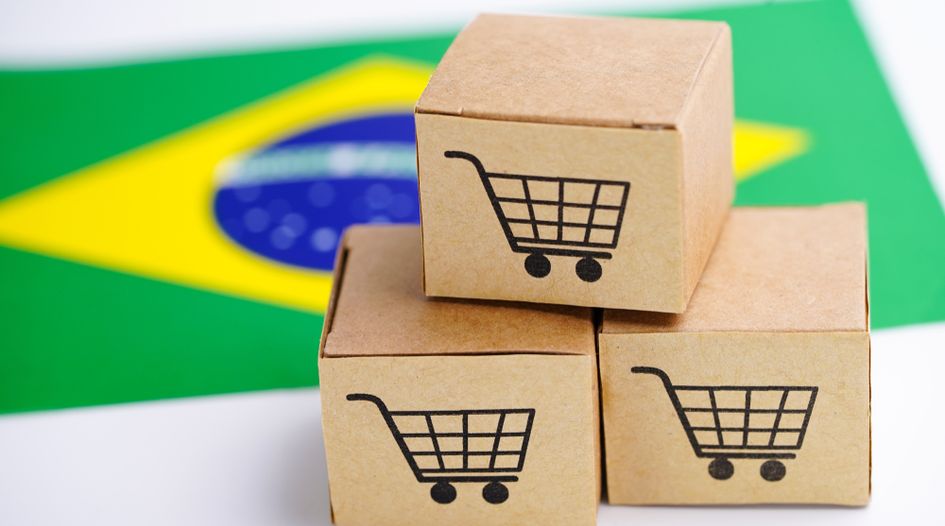Brazil: Market growth pushes anti-counterfeiting efforts up the agenda

This is an Insight article, written by a selected partner as part of WTR's co-published content. Read more on Insight
Legal framework
The growth of the Brazilian market and economy has been paralleled by an increase in counterfeiting activities. The enforcement of IP rights involves planning, technology, intelligence, training and coordination. It is supported by several laws and treaties as well as the relevant rules of the Federal Constitution, the Civil Code, the Criminal Code, the Civil Procedure Code, the Criminal Procedure Code and administrative statutory instruments.
The legal framework for anti-counterfeiting includes:
- the Industrial Property Law (9,279/96);
- the Copyright Law (9,610/98);
- the Software Law (9,609/98); and
- the Internet Law (12,965/14);
- the General Sport Law (14.597/23).
In addition, Brazil is a signatory to the main international IP instruments, such as:
- the Paris Convention for the Protection of Industrial Property (as revised in Stockholm in 1967);
- the Agreement on Trade-Related Aspects of Intellectual Property Rights (TRIPs);
- the Berne Convention for the Protection of Literary and Artistic Works;
- the Washington Copyright Convention;
- the Universal Copyright Convention;
- the Rome Convention for the Protection of Performers, Producers of Phonograms and Broadcasting Organisations; and
- the Geneva Convention for the Protection of Producers of Phonograms against Unauthorised Duplication of their Phonograms.
Concerning trademark and copyright practice, the following acts are considered violations of IP rights in both the civil and criminal spheres:
- trademark infringement;
- geographical indication infringement;
- unfair competition practices; and
- copyright and software violations.
Enforcement provisions allow rights holders to take civil action to prevent further infringement and to recover losses incurred from actual infringement and criminal actions, with a view to convicting the infringers and imposing the penalties established by law. However, in practice, the penalties provided by the legislation are very low, and counterfeiters often have their prison sentences replaced by fines paid to the state.
Lawsuits are usually heard by state courts, while the federal courts hear actions seeking to declare void an IP right issued by the Brazilian Patent and Trademark Office (BPTO).
In Brazil, the rights holder, the licensee and some associations (eg, copyright collecting associations) have legal standing to bring a civil lawsuit for IP infringement.
Border measures
The following statutory instruments regulate border measures in Brazil:
- Article 198 of the Industrial Property Law;
- Articles 605 to 608 and 803 of the Customs Regulatory Act (Federal Decree 6,759/09);
- TRIPs; and
- certain other laws and rules.
These regulations set forth the general guidelines for inspecting and retaining merchandise suspected of being counterfeit. They also establish the administrative procedures for final seizure and destruction.
Due to the great length of Brazil’s national borders, imported merchandise is monitored by Customs through sampling processes.
Retentions are made ex officio or at the rights holder’s request when there is prima facie evidence of violation. Thus, customs officers can hold for inquiry goods that are suspected of infringing trademarks and copyrights. Once the merchandise has been held, the rights holder or its trademark attorney is contacted to collect samples and to state, through a formal declaration and within 10 business days, whether the goods are genuine. If they are genuine, the products are released to the importer.
If the holder of intellectual property rights recognises that the product is not original, they can prevent its entry into national territory through an administrative measure by initiating a customs procedure or by filing a judicial measure. In the latter case, the rights holder seeks to obtain an injunction requiring Customs to disclose the name and address of the importer – as these data are treated by authorities as privileged and covered by tax privacy – in order to pursue the importer's judicial condemnation to payment of damages, as well as to request the destruction of the infringing merchandise.
Due to a narrow interpretation of the law, some customs agencies require the rights holder to file a lawsuit to seize the counterfeit goods. Others accept administrative requests. Rights holders must be aware of such discrepancies and decide the best approach based on the agency through which the products have been imported. Some customs agencies interpret the law to mean that the lawsuit is mandatory and they release the goods if none is filed; others understand that the technical report presented by the rights holder attesting to the counterfeiting is enough to seize the suspected items and destroy them through the administrative tax procedure. The rights holder would only file a lawsuit if they had a strategic interest in obtaining the importer’s data, in addition to receiving compensation for damages, besides the order to abstain from the illicit act. In December 2013 the BPTO launched the National Directory for Combating Trademark Counterfeiting. This is a central database where authorities engaged in combating piracy (eg, the police, Customs and federal prosecutors) can access detailed information on trademarks that are targets for counterfeiting activities.
As established by the National Council for the Combat of Piracy Resolution 1/2011, the directory will assist public authorities in:
- obtaining samples, manuals and information on original products for the examination of seized counterfeiting goods by the police;
- obtaining complaints and documents to file a police investigation or file a report on raids aimed at curbing trade in counterfeit goods;
- obtaining technical opinions concerning the authenticity of retained or seized goods by public authorities; and
- making decisions on the detention of suspected counterfeit goods.
Since its inclusion in the National Plan to Combat Piracy (2022/2025), the National Directory for Combating Trademark Counterfeiting has grown in strength and its use by the main authorities involved in combating piracy has expanded throughout the national territory.
A general request for surveillance can be filed at the Customs General Management Office. However, rights holders can also express their concerns and ask customs officials directly to carry out inspection and monitoring, training them about the features of their brands and products. Both personal contact with and training of customs agents to identify infringing goods are possible and are usually recommended.
Criminal prosecution
Lawsuits for trademark infringement are prosecuted before state courts and through private criminal prosecution brought by the rights holder. However, most acts of copyright infringement (except for software infringement) are prosecuted before state courts as public criminal actions.
While the penalties for trademark infringement range from fines to imprisonment of three months to one year or a fine, the penalties for copyright infringement (where the violation has economic consequences) may vary from a fine to imprisonment of two to four years.
Before a criminal prosecution for trademark infringement is initiated, the illegal activity must be proved. Before filing a lawsuit seeking detention of the infringer, the rights holder must proceed with a preliminary criminal search and seizure action. This requires a court-appointed expert to seize and examine samples of the products. If infringement is confirmed, the expert’s opinion is homologated by the criminal judge and the rights holder will have 30 days to file the criminal action.
In cases of copyright infringement, the public authorities can initiate the public criminal action ex officio or at the request of the rights holder. In both cases, the copyright owner may participate in the action as an assistant to the public prosecutor.
Since piracy and counterfeiting are criminal offences, the law also grants enforcement authorities the discretionary power to conduct police raids against such activities. Raids are usually conducted in city areas where many street sellers or shops sell counterfeits, especially in places known to be important trade areas that are responsible for the distribution of products in the Brazilian territory, in addition to areas famous for being regions dedicated to the manufacturing of these products.
Following the seizure of merchandise in raids, the products are analysed by police experts, a final report is prepared and the rights holder and/or the public authorities are required to file the subsequent criminal actions. Police and criminal actions are effective enforcement remedies in many circumstances and the equipment and machinery used for the counterfeiting activity can also be seized and destroyed. An advantage of police raids is that they can be conducted against many infringers simultaneously, and even against infringers that have not previously been identified.
Civil enforcement
The Industrial Property Law establishes that, independent of the criminal action, the aggrieved party may file a civil lawsuit, seeking interim injunctive relief and damages. Both the Industrial Property Law and the Civil Procedure Code allow the granting of ex parte preliminary restraining and/or search and seizure orders. To obtain injunctions of this nature, the following procedural requirements must be met by the rights holder:
- evidence of its right;
- substantial and unquestionable proof of infringement; and
- elements that may demonstrate a reasonable degree of risk of damage if the injunction is not granted.
In some enforcement circumstances, it is recommended to issue a cease and desist letter before going to court.
Right holders may use a variety of judicial procedures to protect their intellectual property, from filing lawsuits with damage claims arising from the proven violation, to preparatory lawsuits to obtain proof of the violation (for example to identify
sellers of counterfeit products that use famous online marketplaces to trade their illegal products), to obtaining judicial authorisation to conduct search and seizure at establishments manufacturing counterfeit products, and to conduct
preliminary inspections on computers, servers and related devices in the search for illegal licences. Finally, the violation of any IP right creates an obligation to pay damages. To this end, the Industrial Property Law rules that the damages
will be calculated based on the most favourable criterion to the injured party, as follows:
- the benefits that would have been gained by the injured party if the violation had not occurred;
- the benefits gained by the party that violated the rights; or
- the remuneration that the violator would have paid to the rights holder for a licence that would have permitted it to exploit the rights legally.
The civil compensation procedures are often slow and time-consuming, and their success depends on the defendant’s financial situation.
Tax enforcement
In addition to Customs inspecting products entering the Brazilian territory, the Federal Revenue Service also carries out enforcement measures, resulting in the removal of tons of counterfeit products from the Brazilian market.
When a complaint is presented from the rights holder, accompanied by substantial and unquestionable proof of the irregularity (tax crimes and crimes against intellectual property) of the products, the Federal Revenue Service will seize the irregular products. At the end of the fiscal procedure, these items will be sent for destruction and those responsible will be penalised.
If the rights holders wish, they can, on conclusion of the fiscal procedure, obtain the identification of the offenders responsible for selling the irregular products and file a civil enforcement action to recover part of the losses or even a criminal conviction.
Anti-counterfeiting online
In 2014, Congress enacted Law 12965/2014, known as the Brazilian Civil Rights Framework for the Internet. This law aims to establish principles, guarantees, rights and obligations concerning the use of the Internet in Brazil, as well as to provide guidelines for the public administration on the matter.
Brazil has no specific statute dealing exclusively with online IP infringement, but the legal framework – including the Internet Law – provides an enforcement system against online counterfeiting activities. Case law dealing with online infringement
has held that Brazil has jurisdiction over disputes arising from facts occurring or having effect within Brazilian borders. Online infringements are litigated before civil and criminal state courts. Only IP rights validity claims and specific international online infringements fall under federal jurisdiction and must be litigated before a federal court.
The complaint must present evidence of the infringed right, the facts and the connection between these and the defendant (eg, website administrator or internet service provider). It is not mandatory to identify the party that is responsible for the alleged infringement, but it is recommended and generally necessary to execute future enforcement measures.
Confronted by a significant increase in the marketing of counterfeit products on the Internet and the existing legal gap in Brazil regarding the regulation of marketplace and social media platform activities, in 2020 the National Council for Combating Piracy (CNCP) published a Best Practices Guide. Through this guide, certain measures were defined that should be implemented by platforms to protect the intellectual property of third parties. However, as the guide lacks legal force, it has not shown the desired effectiveness. For instance, some platforms, despite adhering to the Best Practices Guide, do not meet the goals established in it. For this reason, the CNCP has been working on drafting a law that will regulate the operations of marketplaces, which will likely strengthen the fight against the sale of counterfeit products in the virtual environment and provide rights holders with efficient means to identify those responsible for such violations.
Despite the challenging scenario regarding the sale of counterfeit products online, Brazil has demonstrated remarkable advances in combating the online piracy of audiovisual works. A notable example is Operation 404, conducted by the Department of Justice. In the latest operation, carried out in November 2023, over 600 websites and apps that disseminated irregular content were taken down. This initiative showcases the country's commitment to fostering a safer and more ethical online environment for creators and consumers.
Preventative measures/strategies
Besides registering trademarks, certain preventative measures should be taken to enhance the chances of success of an anti-counterfeiting campaign.
Under Brazilian law, the use of local legal counsel is mandatory when a complaint is filed before the courts. The chosen counsel should be experienced in IP matters, as well as civil, police and customs remedies. The use of investigators is important, since in Brazil the burden of proving the infringement lies with the plaintiff in both criminal and civil cases and the defendant is always entitled to withhold from the plaintiff any self-incriminatory evidence.
Whenever possible, the use of authentication technology (eg, security labels and authentication checking devices) to fight counterfeiting is helpful, and investment in these new technologies is increasing in Brazil. Continuous monitoring
of possible counterfeiters is a basic necessity, and sellers of the original goods should be taught how to identify counterfeit goods, receive incentives to do so, report infringements and receive feedback.
With the significant increase in the sale of counterfeit products over the Internet, monitoring online marketplaces and platforms has become a key preventative measure.
In addition, cooperation with official anti-counterfeiting agencies and financial services companies is indispensable to implementing and maintaining a successful anti-counterfeiting programme. Cooperation can include exchanging investigative
information, providing in-person training and collaborating on the logistical organisation of major raids. Dialogue with the competent authorities must not stop; if the rights holder so desires, such dialogue can be conducted through alliances or associations dedicated to fighting counterfeiting formed by companies with similar activities.






